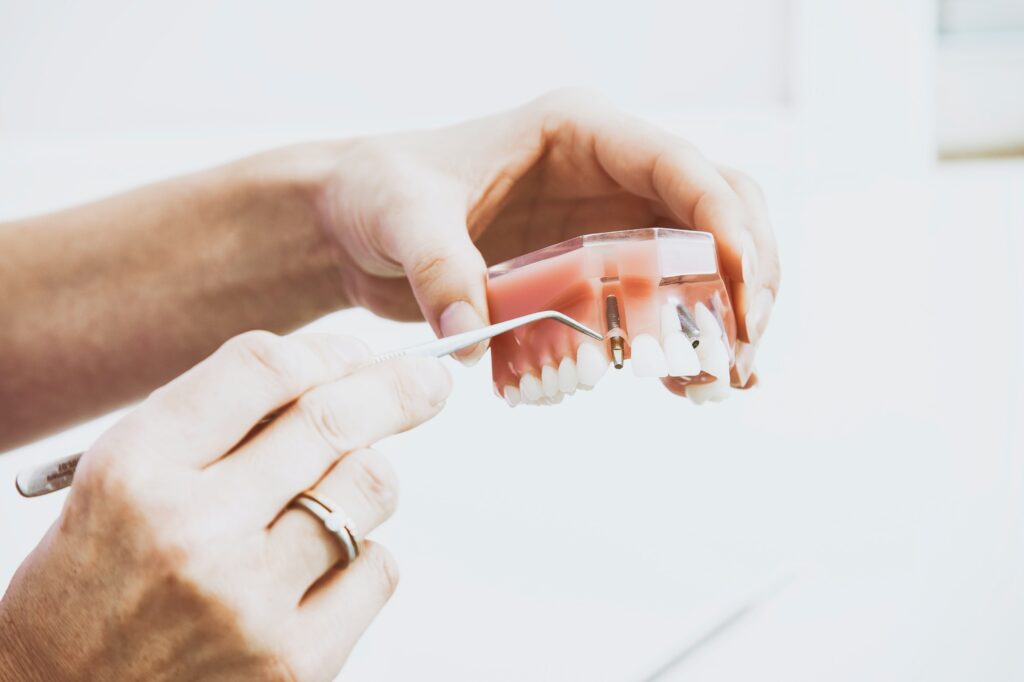
What Are Implant-Retained Dentures?
Boisson Family Dental Group has been operating in Grande Prairie for almost 30 years. Implant retained dentures are one of the dental services we offer here at our family dental practice in Grande Prairie.
Implant-retained dentures are a type of denture that is secured in place using dental implants instead of relying on the gums or adhesive to keep them in place. Dental implants are small metal posts that are surgically placed into the jawbone, and once they are fully healed, they can serve as anchors for dentures.
Implant-retained dentures typically use two to four dental implants, which are strategically placed to provide optimal support for the denture. The denture is designed with special attachments that snap onto the implants, holding it securely in place.
What Are the Benefits of Implant-Retained Dentures?
Implant-retained dentures offer several advantages over traditional dentures. Because they are anchored to the jawbone, they provide a more stable and secure fit, which can improve your ability to eat and speak. Additionally, they do not require adhesives or pastes, which can be messy and inconvenient.
Implant-retained dentures are also more comfortable than traditional dentures, as they do not put pressure on the gums, which can cause discomfort or soreness. They also help to preserve the bone in your jaw, which can prevent the sunken-in appearance that can occur with traditional dentures.
Overall, implant-retained dentures are a popular and effective solution for individuals who are missing multiple teeth and are looking for a more secure and comfortable alternative to traditional dentures. However, they may not be suitable for everyone, and it is important to speak with your family dentist in Grande Prairie to determine if they are right for you.
What Are the Types of Implant-Retained Dentures?
There are two main types of implant-retained dentures: bar-retained dentures and ball-retained dentures. Both types use dental implants to secure the denture in place, but they do so in slightly different ways.
Bar-Retained Dentures
In this type of implant-retained denture, a thin metal bar is attached to two to four dental implants that have been surgically placed into the jawbone. The denture is then fitted with clips or other attachments that snap onto the bar, holding the denture securely in place.
Ball-Retained Dentures
Also known as stud-attachment dentures, this type of implant-retained denture uses a ball-and-socket mechanism to hold the denture in place. The dental implants have a ball-shaped attachment that fits into a socket on the denture, providing a secure connection.
Both types of implant-retained dentures offer advantages over traditional dentures, as they provide a more stable and comfortable fit, and do not require adhesives or pastes to stay in place. The type of implant-retained denture that is best for you will depend on several factors, including the number and location of missing teeth, the condition of your jawbone, and your personal preferences. Your Grande Prairie family dentist can help you determine which type of implant-retained denture is right for you.
How Do Implant-Retained Dentures Work?
Implant-retained dentures work by using dental implants as a foundation for the denture, which provides a secure and stable fit. Here’s how the process typically works:
Initial consultation: Your dentist will examine your mouth and take X-rays and impressions to assess your oral health and determine if you are a candidate for implant-retained dentures.
Implant placement: If you are a candidate, the dental implants will be surgically placed into the jawbone. This is usually done under local anesthesia, and you may be given sedation to help you relax during the procedure.
Healing period: After the implants are placed, there is a healing period of several months during which the implants fuse with the jawbone in a process called osseointegration. During this time, you may wear a temporary denture to help you eat and speak normally.
Attachment of abutments: Once the implants have fully integrated with the jawbone, abutments (small metal posts) are attached to the implants. These abutments serve as connectors between the implants and the denture.
Fitting of denture: The denture is custom-made to fit your mouth and is designed with attachments that fit onto the abutments. Depending on the type of implant-retained denture, the attachments may be clips that snap onto a metal bar or ball-and-socket mechanisms that attach directly to the implants.
Follow-up visits: After the denture is fitted, you will have follow-up visits with your dentist to ensure that it is fitting properly and to make any necessary adjustments.
Implant-retained dentures offer several benefits over traditional dentures, including increased stability and comfort, improved speech and chewing ability, and a more natural-looking smile. However, the process of getting implant-retained dentures can take several months and may require multiple visits to your dentist or prosthodontist. It’s important to follow your Grande Prairie family dentist’s instructions for care and maintenance of your implant-retained dentures to ensure they last for many years.
Who Are the Best Candidates for Implant-Retained Dentures?
Implant-retained dentures can be an excellent option for many people who are missing multiple teeth. The best candidates for implant-retained dentures are typically those who:
Have good overall oral health: Candidates for implant-retained dentures should have healthy gums and enough jawbone density to support the dental implants. If there is not enough bone density, bone grafting may be necessary before the implants can be placed.
Are missing multiple teeth: Implant-retained dentures are most commonly used for people who are missing several teeth in one or both arches of the mouth. They can be used to replace upper or lower teeth or both.
Are unhappy with traditional dentures: If you have tried traditional dentures but find them uncomfortable or difficult to wear, implant-retained dentures may be a good option. Implant-retained dentures are more stable and secure than traditional dentures, and they do not require adhesives or pastes to stay in place.
Are committed to good oral hygiene: Like natural teeth, implant-retained dentures require regular brushing and flossing to maintain good oral health. Candidates for implant-retained dentures should be committed to a regular oral hygiene routine and have regular check-ups with their dentist.
Are in good overall health: Candidates for implant-retained dentures should be in good overall health and free of conditions that may interfere with the healing process, such as uncontrolled diabetes or a weakened immune system.
If you are considering implant-retained dentures, it’s important to speak with your Grande Prairie family dentist to determine if they are right for you. The Drs. Boisson can evaluate your oral health and help you understand the benefits and risks of this type of dental restoration.
Give Boisson Family Dentist in Grande Prairie a call to learn more:
☎️ 587-771-7668
https://www.boissondental.ca/
info@boissondental.ca
